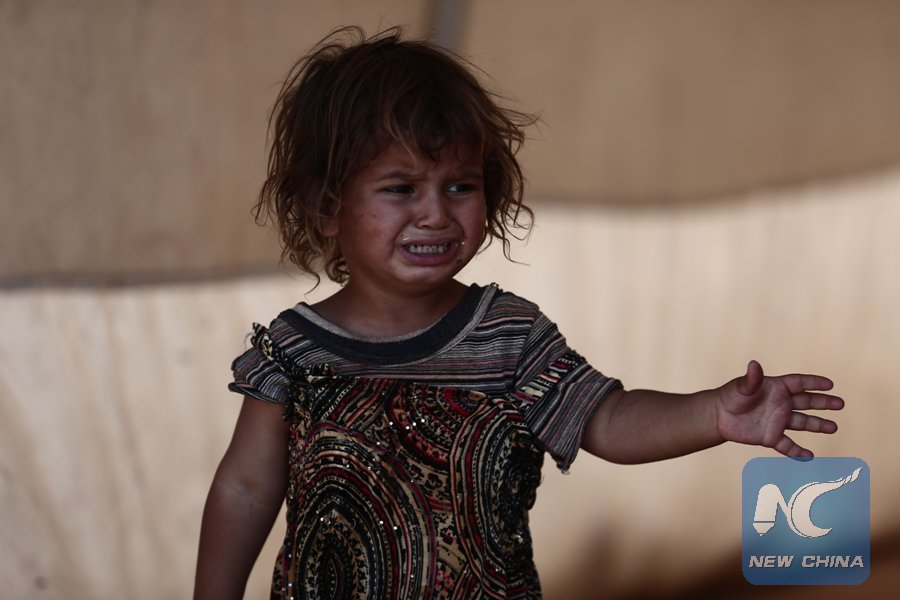
A child cries at a camp for the displaced from the rebel-held Syrian province of Idlib, at the village of al-Ghadfa, southeast of the province on Sept. 2, 2018. (Xinhua/AFP)
UNITED NATIONS, Sept. 7 (Xinhua) -- The UN humanitarian operation director warned Friday that some 3 million people are at risk amidst the ongoing escalation of hostilities in northwestern Syria.
"There are some 3 million people living in the Idlib de-escalation zone, which includes parts of Idlib, Aleppo, Lattakia, and Hama governorates," John Ging, director of the Operational Division at the UN Office for Coordination of Humanitarian Affairs, told the Security Council.
The Idlib de-escalation zone is the last remaining of the four created by the Astana process, which is poised to be violated. The process, initiated in early 2017 in the neutral Kazakh capital of Astana, works in tandem with the Geneva talks with an aim to resolve the Syrian crisis.
Ging pointed out that of the 3 million, 2.1 million people are in need of humanitarian assistance, including 1.4 million people who are internally displaced.
As a result of insecurity, he said schools in western Idlib around Jisr Ash-Shugur and surrounding communities have been suspended.
Key crossing points between government and opposition controlled areas are also reportedly closed, he added, restricting freedom of movement for the population and contributing to rising food prices and shortages.
In addition, Ging said the UN has provided "deconfliction information" for 125 humanitarian sites in Idlib to military actors, a measure that aims to facilitate identification of humanitarian facilities.
"In their military operations, all parties bear the obligation to take constant care to spare civilians, and civilian objects, including humanitarian workers and humanitarian facilities," he said.
Despite the recent development, the UN and its partners continue to implement a major humanitarian operation throughout Idlib, he said, with an average of two million people reached every month with cross-border assistance from Turkey.
In the meantime, efforts have been ongoing to ensure that people in need can be supported in the event of an increase in hostilities, he noted.
"Plans are in place to support up to 900,000 women, children and men that could be affected by conflict, including for up to a potential 700,000 people who may displace north within Idlib and beyond due to hostilities and some 100,000 people who may cross into government controlled areas," he said.
Humanitarian aid is being prepositioned inside Idlib, as well as in surrounding areas in Aleppo, Lattakia, and Hama, he added.
He underscored a shortage of some 311 million dollars in funding, which is required if there is an increase in violence resulting in mass displacement.
"This is funding we do not have, as multiple crises, in eastern Ghouta, in Afrin, in southern Syria, and in Idlib earlier this year, have strained already limited resources," he explained.
In conclusion of his briefing to the council, he called for a cessation of hostilities, freedom of movement for people, unhindered humanitarian access, and funding for priority response and readiness activities.

